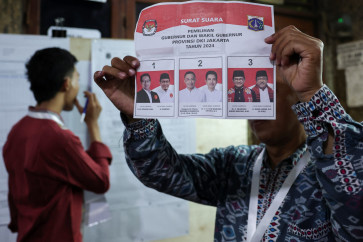Popular Reads
Top Results
Can't find what you're looking for?
View all search resultsPopular Reads
Top Results
Can't find what you're looking for?
View all search resultsPoor protection blamed for repeated abuses of migrant workers
Indonesian migrant workers will always be vulnerable unless the government imposes strict policies to protect them throughout the whole process — from recruitment until their return from overseas employment
Change text size
Gift Premium Articles
to Anyone
I
ndonesian migrant workers will always be vulnerable unless the government imposes strict policies to protect them throughout the whole process — from recruitment until their return from overseas employment.
When it was first reported that Satinah, a migrant worker from Ungaran, Semarang, Central Java, was to face the death penalty for killing her Saudi Arabian employer, the state’s response was too late. Further, the negotiation process appeared ineffective.
“The government had no intention to save Satinah from the death penalty,” Migrant Care executive director Anis Hidayah said at a discussion held by the International Labor Organization (ILO) to commemorate International Migrant Day on Dec. 18.
After tough negotiations, the Saudi government accepted Rp 7.7 billion (US$793,100) in compensation and released Satinah. She was previously required to pay diyyat (blood money) of Rp 25 billion or she would be executed.
Anis said it was as a result of the government’s tardy response that such a critical point was reached.
“If the government had given legal assistance from the very beginning and monitored the case, I think the situation would be different,” she said.
The crisis began in 2009 when a Saudi court sentenced Satinah to death for killing her female employer from Al Ghasseem province, Saudi Arabia, in an incident in 2007.
Migrant Care wrote to the Foreign Ministry in February 2009, asking the government to take steps to save Satinah. A second letter to the ministry followed in October.
The organization received no response from the Foreign Ministry until October 2011 when it received a letter describing measures the government had taken to save Satinah.
The letter came only few months after the Saudi authorities executed Ruyati binti Satubi on June 18, 2011, for killing her employer.
The government seems unable to do anything to protect the workers despite laws to protect them.
Data from Migrant Care shows that as of 2012, 420 migrant workers from Indonesia are facing the death penalty — mostly in Malaysia and Saudi Arabia — 99 have already been executed. In 2012, 16 Indonesian workers were shot by Malaysian police without a clear reason. In a recent case, three Malaysian police officers allegedly gang-raped a 25-year-old Indonesian female worker.
Anis said that 2012 was the year where the Indonesian diplomacy reached its lowest ebb.
“The situation is really bad. The government is passive, slow and seems to lack the ‘teeth’ to save our workers overseas,” said Anis.
Sulistri of the Confederation of Indonesia Prosperity Trade Union (KSBSI) said Indonesia has voiced its commitment to promoting the rights of workers including those overseas.
“It lacks the necessary implementation. Many workers are exposed to abuse in destination countries and during the recruitment process, which is partly caused by weak control of recruitment agencies,” she said.
The government had taken some steps to address this situation in 2012 with its decision to ratify the 1990 convention on migrant workers and the issuance of the president directive or amanat presiden (Ampres) on the revision of Law No. 39/2004 on Indonesian migrant workers.
In April, after more than 20 years, the Indonesian government ratified the International Convention on the Protection of the Rights of All Migrant Workers and Members of their Families.










